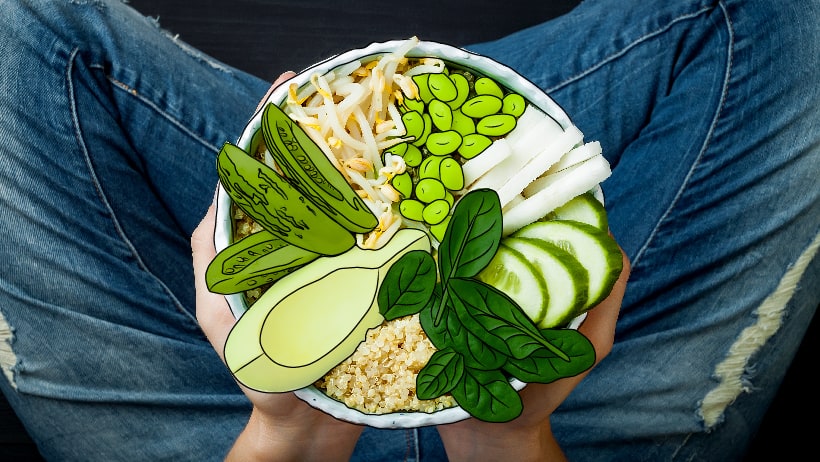
Colon cleanses are extremely popular, often featured in magazines and promoted by fitness influencers. Maybe you’ve wondered if you should try a colon cleanse to lose weight, gain energy, or work toward some other health goal. Unfortunately, the term “colon cleanse” is used so widely these days that it doesn’t have a consistent universal definition.
In this article, we’ll outline the different types of colon cleanses, the benefits of a healthy colon cleanse, and how you can try a safe yet beneficial colon cleanse.
What is a Colon Cleanse?
The term “colon cleanse” can have a myriad of different meanings. Many seek to sell a product, such as a tea or a supplement, with the promise that it will cleanse your colon, leading to weight loss or improved overall health. Beware of these types of colon cleanses and carefully check their ingredients before ingesting them. They often “cleanse” the colon by acting as a laxative, which has no inherent health benefits, and can lead to digestive problems or dehydration.
Others use the term “colon cleanse” to refer to colonic irrigation, also called colonic hydrotherapy. This is a procedure in which a person either inserts an enema into their rectum or a professional uses water to flush out the colon. Although many alternative practitioners promote this practice, doctors caution against it, stating that no research exists to back up its usefulness. Also, there are multiple health risks involved in getting a “colonic,” such as infections and perforations.
Three Benefits of a Healthy Colon Cleanse
There are certainly healthy ways to cleanse the colon without the use of laxatives and colonic irrigation, which may feel extreme. Healthy colon cleanses involve removing foods that cause sluggishness, health issues, and inflammation in your digestive tract. Certain supplements can also restore balance in the colon.
Here are three benefits of doing a healthy colon cleanse:
1. Balance your gut microbiome
Our digestive tract contains its own ecosystem made up of a unique combination of hundreds of strains of bacteria in addition to yeast and other microorganisms. The majority of these bacteria are considered “good” bacteria. Your microbiome is formed based on a variety of factors, especially the foods you eat.
While researchers are just beginning to grasp the human gut microbiome, initial research shows it has a profound impact on a variety of illnesses as well as weight. Balancing your microbiome could help you reach a healthy weight and lessen other health symptoms, such as pain or fatigue.
2. Lighten your digestive system’s workload
It goes without saying that some foods are easier for your digestive system to process than others. Highly-processed foods and animal products are harder to digest than fruits and vegetables. Alcohol, preservatives, pesticides, and artificial additives all affect your microbiome and add stress to your liver, pancreas, and kidneys.
Removing harder-to-digest foods from your diet for a period of time gives your digestive system a temporary break. It can also help you adjust to a healthier diet and lifestyle, such as eating more veggies and drinking more water.
3. Change your cravings and relationship to food
A colon cleanse can help quell your cravings and change your overall relationship to food. When you cut out added sugar, your taste buds literally change and, with time, you stop craving sweets as much.
A cleanse can also change your relationship to food for the better as you become more aware of your eating habits. You may realize that you often turn to food for emotional reasons, rather than out of true hunger. Unnecessary eating leads to weight gain and puts added strain on the digestive system. If a colon cleanse ultimately changes your eating habits, your digestive system will thank you for years to come.
How to Try a Colon Cleanse
Any cleanse that involves cutting out hard-to-digest foods can be considered a “colon cleanse.” You can start with as a little as a one-day cleanse or go for an entire month. Detox cleanses and weight loss cleanses could both be considered effective colon cleanses. Since animal products are more complex and difficult to digest, a plant-based or vegan cleanse may be the way to go. Juice and soup cleanses are ideal for the colon as liquids are easier to digest than solids. Be sure to drink juices that are low in sugar. If consuming only liquids sounds too extreme, you can also successfully cleanse with solid foods.
Consider adding gut-friendly supplements to your diet. Probiotics, prebiotics, and digestive enzymes can help rebalance your colon’s microbiome. Because we all have a different microbiome and there’s no single “correct” microbiome makeup, there’s no one-size-fits-all when it comes to digestive supplements. Try different types of probiotic or prebiotic supplements until you find the one that works best with your digestion.
Once you’ve found a cleanse and supplement that fits your goals and body, consider revisiting it multiple times a year. Periodic colon cleansing is a practice that can keep your digestive system in optimal health and greatly improve your overall eating habits.